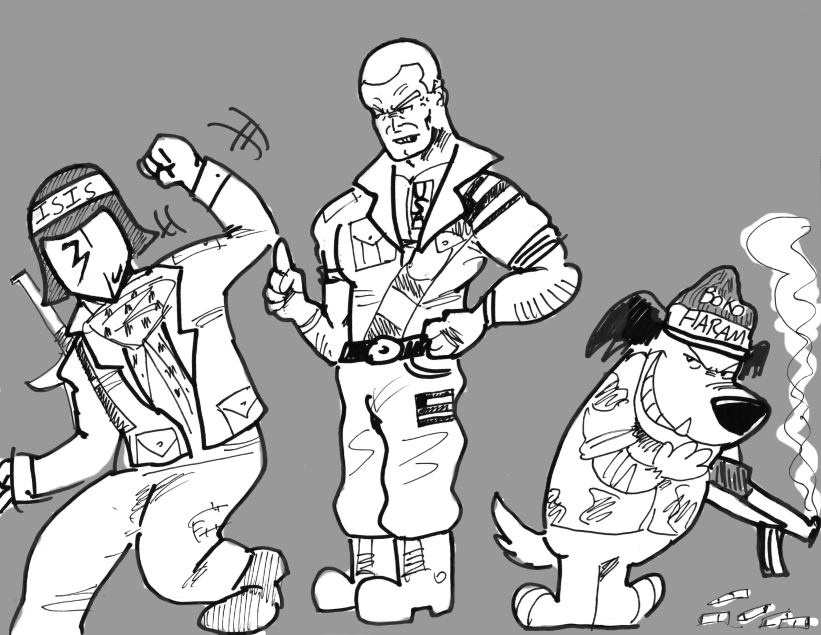The Islamic State grabbed headlines yet again last Tuesday when militants released horrifying video footage of a captured Jordanian pilot being burned alive. You might not know that two days later, Boko Haram fighters shot and burned to death about 90 civilians in Cameroon.
Last spring, Boko Haram was the target of the #BringBackOurGirls campaign. The campaign was a viral protest meant to raise awareness of the group’s abduction of over 200 Nigerian schoolgirls. The movement, though largely ineffective, helped spread much-needed awareness of Boko Haram’s cruelty.
But since then, news and awareness about the group seem to have died down despite the group’s continued atrocities. Thursday’s massacre failed to make the front page of many major news sites. I had to learn about it from BuzzFeed News, embarrassingly enough.
The disparity in news coverage between IS and Boko Haram is perplexing because the groups are similar in many ways. Based out of Nigeria, Boko Haram (which means “Western education is forbidden”) seeks to capture territory, create a Nigerian Islamic state and institute Sharia law. Like IS, Boko Haram releases video propaganda and images of terrible acts of violence against civilians.
I can’t help but get the feeling one reason Boko Haram flies under most Americans’ radars is it fits the stereotype of Africa as a broken, dangerous place. Rather than a vast and varied continent, American media tend to portray a uniform land of disease, poverty and violence.
This portrayal does wonders for viral justice campaigns like #BringBackOurGirls or Kony 2012, but it does little to educate Americans about what really happens in African countries.
Another reason for the lack of Boko Haram coverage may be the group does not appear as threatening as IS.
According to AfricaCheck.org, Boko Haram killed at least 9,000 people in Nigeria between 2009 and 2014. Meanwhile, according to a UN report, IS killed almost 9,000 Iraqi civilians in the first eight months of 2014 alone.
Similarly, estimates put Boko Haram’s strength at between 7,000 and 10,000 fighters in Nigeria. The CIA estimates IS may have up to three times as many fighters in Iraq and Syria.
But try telling someone whose house was burned down by the group or whose children were killed or kidnapped that the group poses less of a threat than IS. We owe it to Nigerians to tell their stories just as we tell those of Iraqis.
More cynically, American media’s relative apathy to the plight of Nigerians may be political.
IS is a goldmine for talking heads. The group is notorious for taking hostages, at which point political pundits can argue about the efficacy of negotiating with terrorists. And they’ve got the word “Islamic” right there in the name, a buzzword in the newest wave of Islamophobia.
But more importantly, IS provides armchair critics the perfect opportunity to evaluate U.S. policy in Iraq.
Everything old is new again, from Bush’s post-9/11 response to Obama’s exit strategy. Some analyses go all the way back to Europe’s divvying up of the former Ottoman Empire to explain the rise of IS.
Nigeria does not offer the same opportunity, unless it is to critique our relative failure to act in the country.
But don’t news organizations have a responsibility to cover important events, regardless of ulterior motives? Last year’s #BringBackOurGirls campaign seems proof enough that many media outlets only care to cover a story when it is fashionable. After all, once all of the fuss died down, did you find out what happened to those girls?
They were forcibly married off to Boko Haram fighters, according to a few non-U.S. reports. Responsible media follows a story through to the end, whether it is currently trending or not.
Alex Mendoza is a 22-year-old political science and international studies senior from Baton Rouge. You can reach him on Twitter @alexmendoza_TDR.
Opinion: US shouldn’t ignore Boko Haram’s terrorism in Nigeria
By Alex Mendoza
February 8, 2015
More to Discover








